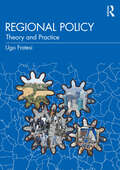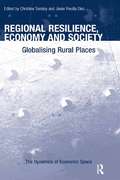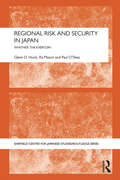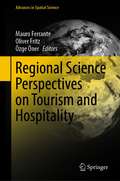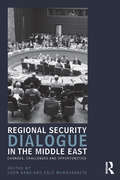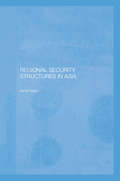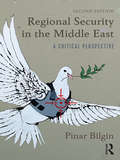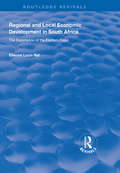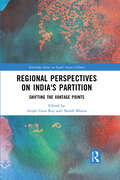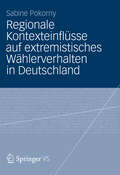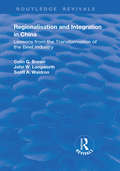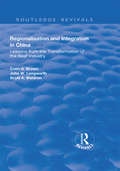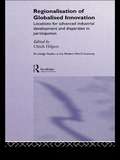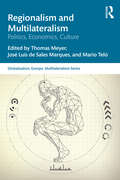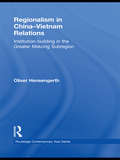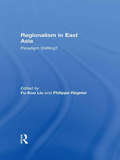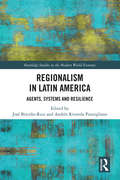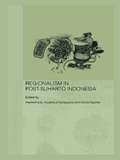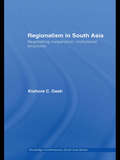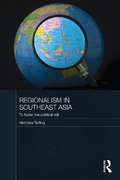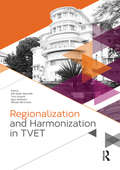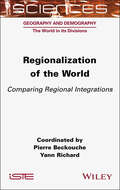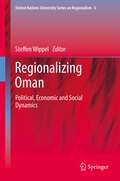- Table View
- List View
Regional Policy: Theory and Practice
by Ugo FratesiRegional policy is an essential in any government’s toolkit for promoting socioeconomic prosperity. It comes in many forms and can be used to target the development of weak and stronger regions. This textbook provides comprehensive and systematic coverage of regional policy, dealing with core theories and looking at contemporary challenges in practice, addressing regional policy across the world. Structured in four parts, the book opens with an exploration of regional policy’s characterisation, aims and rationale. The second part is devoted to issues of implementation and the instruments available to policymakers for intervention. The third part addresses regional policy evaluation, as well as statistics and modelling in policymaking. Finally, the book discusses how regional policy is applied in different contexts. Each chapter contains real-life examples of a regional policy topic in action and highlights supplementary topics for advanced readers. With its broad coverage of the subject, Regional Policy: Theory and Practice will prove a valuable resource for advanced students, researchers and practitioners in regional policy, regional economics, economic geography, planning and public policy.
Regional Resilience, Economy and Society: Globalising Rural Places (The Dynamics of Economic Space)
by Javier Revilla Diez Christine TamásyThere has been a great deal of restructuring of rural places and communities under globalisation, highlighting the interaction of local and global actors to produce new hybrid socio-economic relations. Recent research highlights the heterogeneity of globalisation in which rural places are different to each other, but also different to how they were in the past. Bringing together an interdisciplinary team of academics, and comparative case studies from Europe (West and East) and Asia, this book explores and discusses opportunities and challenges associated with globalising rural places, and identifies possibilities for policy and practical intervention by rural development actors. Special attention is paid to multi-scalar processes through which rural places are reshaped through globalisation. Taking a geographical approach, the book produces new critical work on the interdependence between globalisation and rural spaces. It is organised into five sections: Part I focuses on ’Global-Rural Linkages’ showing the multifaceted interrelation between actors at different geographical scale and demonstrating that globalisation is not only external to rural spaces. Part II on ’Rural Entrepreneurship and Labour Markets’ explores the potential of business start-ups in rural spaces which are not only necessity driven. Part III ’Rural Innovation and Learning’ shows that rural places are also places for innovation and learning. Part IV on ’Rural Policies and Governance’ argues that regional policies for rural places should promote side activities to maintain social capital and that regional policy should take a more integrative perspective between urban and rural spaces in order to explore complementary development paths. The concluding chapter ’New Approaches to Rural Spaces’ discusses new approaches to globalising rural places in relation to the preceding chapters published in this book.
Regional Risk and Security in Japan: Whither the everyday (The University of Sheffield/Routledge Japanese Studies Series)
by Paul O'Shea Glenn D. Hook Ra MasonJapan’s unusual position in the realm of international politics encapsulates a three-fold juxtaposition: both in and out of Asia, both occupied by and a close ally of the United States, and both a key trade partner and a strategic rival of China. Whilst international relations theory offers a number of ways to analyse these relations, this book instead utilizes the concept of risk to provide an innovative perspective on Japan’s relations with China, North Korea and the US. The book elucidates how risk, potential harm and harm are faced disproportionately by certain groups in society. This is demonstrated by providing an empirically rich analysis of the domestic implications of security relations with China, North Korea and the United States through the presence of US troops in Okinawa. Beginning with a theoretical discussion of risk, it goes on to demonstrate how the concept of risk adds value to the study of international relations in three senses. First, the concept helps to break down the boundaries between the international and domestic. Second, the focus on risk and the everyday directs us to ask basic questions about the costs and benefits of a security policy meant to secure the national population. Third, what implications do these two points have for governance? The question is one of governance as Japan’s externally oriented security policy produces domestic insecurity shared disproportionately, not equally, as this volume makes clear. Developing the theory of risk as a tool for understanding international relations, this book will be of great interest to students and scholars of Asian politics, Japanese politics, international relations and security studies, as well as to policy makers and practitioners working in the field.
Regional Science Perspectives on Tourism and Hospitality (Advances in Spatial Science)
by Mauro Ferrante Oliver Fritz Özge ÖnerThis book approaches the tourism and hospitality industry from a regional science perspective. By analyzing the spatial context of tourist travels, the hospitality sector, and the regional impacts of tourist activities, it demonstrates the value of the regional science paradigm for understanding the dynamics and effects of tourism and hospitality-related phenomena. Written by leading regional science scholars from various countries as well as professionals from organizations such as OECD and AirBnB, the contributions address topics such as migration, new types of accommodation, segmentation of tourism demand, and the potential use of tracking technologies in tourism research.The content is divided into five parts, the first of which analyzes spatial effects on the development of firms in the tourism industry, while the second approaches temporal and spatial variability in tourism through analytical regional science tools. The broader economic and social impacts of tourism are addressed in part three. Part four assesses specific tourism segments and tourist behaviors, while part five discusses environmental aspects and tourism destination policies. The book will appeal to scholars of regional and spatial science and tourism, as well as tourism specialists and policymakers interested in developing science and evidence-based tourism policies.
Regional Security Dialogue in the Middle East: Changes, Challenges and Opportunities (UCLA Center for Middle East Development (CMED) series)
by Chen Kane Egle MurauskaiteAt this time of considerable political turmoil in the Middle East, there is a pressing need to explore alternative frameworks for regional security. The book discusses the Helsinki Process as one potentially relevant historical model to learn from. The Helsinki Process began in a divided Europe in the early 1970s and, over 40 years, achieved major successes in promoting cooperation between the Warsaw Pact and NATO member states on social, human rights, security, and political issues. In this volume, established Middle East experts, former diplomats, and emerging scholars assess the regional realities from a broad range of perspectives and, with the current momentum for reform across the Middle East, chart a path towards a comprehensive mechanism that could promote long-term regional security. Providing a gamut of views on regional threat perception and suggesting ways forward for regional peace, this book is essential reading for students and scholars with an interest in Politics, the Middle East and Conflict Studies.
Regional Security Structures in Asia
by Ashok KaporKapor argues that explanations of international relations in Asia in the post-Second World War period have relied too much on the Cold War as a key explanatory factor, and have not given enough emphasis to the useful concepts of 'regional power formation', 'conflict formation' and 'conflict resolution'. The author outlines these concepts and goes on to elaborate on them, and to apply them to three key Asian regions - northeast, southeast, and south Asia - discussing practical strategic issues in an historical perspective and arguing that these concepts, and other concepts which he discusses, are extremely helpful in making sense of the complex pattern of international relations in Asia.
Regional Security in the Middle East: A Critical Perspective (Routledge Advances In Middle East And Islamic Studies #Vol. 5)
by Pinar BilginIn this new and fully revised edition Pinar Bilgin provides an accessible yet critical analysis of regional security in the Middle East, analysing the significant developments that have taken place in the past years. Drawing from a wide range of critical approaches to security, the book offers a comprehensive study of pasts, presents, and futures of security in the region. The book distinguishes itself from previous (critical) studies on regional security by opening up both ‘region’ and ‘security’. Different from those approaches that bracket one or the other, this study takes seriously the constitutive relationship between (inventing) regions, and (conceptions and practices of) security. There is not one Middle East but many, shaped by the insecurities of those who voice them. This book focuses on how present-day insecurities have their roots in practices that have, throughout history, been shaped by ‘geopolitical inventions of security’. In doing so, the book lays the contours of a framework for thinking critically about regional security in this part of the world. This second edition of Regional Security in the Middle East is a key resource for students and scholars interested in International Relations and Political Science, Security Studies, and Middle East Studies.
Regional and Local Economic Development in South Africa: The Experience of the Eastern Cape (Routledge Revivals)
by Etienne Louis NelFirst published in 1999, this volume responds to the recent application of Local Economic Development around the world and examines its impact in South Africa in the wake of the nation’s recent political transition. Etienne Louis Nel observes how the initiative is taking on a dual form of community-led and authority-led initiatives. Nel explores the issue through areas including South Africa’s space economy, a case study of Stuttenheim and local economic development in East London.
Regional perspectives on India's Partition: Shifting the Vantage Points (Routledge Series on South Asian Culture)
by Nandi Bhatia Anjali Gera RoyThis book expands the scope of understanding of the vast, albeit uneven, experience of the 1947 Partition of India by including localities and life stories from and beyond the regions of Punjab and Bengal. Building on existing research on Partition, the chapters present and analyse the consequences of Partition displacement and the resilience of communities in different parts of the nation. Regions discussed include the Chitmahals, Assam, Tripura, Mizoram, Hyderabad, Andaman Islands, and Jammu and Kashmir. The contributors show that the heterogeneity of people’s experiences reside in spaces of the family, home, neighbourhoods, villages, towns and cities refugee settlements, letters, memoirs, biographies, films, fiction, oral histories, and testimonies. The book examines the Partition’s complex effects in regions, localities and contexts and its material and psychological ramifications. This book is a unique and comprehensive contribution in enabling a more complex understanding of how Partition played out and continues to do so for groups and generations across India. It will be of interest to a multidisciplinary audience, including history, literature, comparative literature, colonial and postcolonial studies, modern Asian studies, studies of South Asia, and studies of memory and trauma.
Regionale Kontexteinflüsse auf extremistisches Wählerverhalten in Deutschland
by Sabine PokornyIn der empirischen Wahlforschung ist man der Meinung, dass der regionale Kontext keinen relevanten Einfluss auf das individuelle Wahlverhalten mehr ausübt. Nur selten wird diese These jedoch mit angemessenen Methoden empirisch untersucht. Besonders für die Wahl extremistischer Parteien ist der Einfluss des regionalen Kontextes noch wenig beleuchtet. Sabine Pokorny untersucht mithilfe eines Mehrebenenmodells, welche Rolle regionale Kontextfaktoren im Zeitraum von 1998 bis 2006 für die Wahlentscheidung zugunsten einer rechtsextremistischen Partei auf der einen und einer linksextremistischen Partei auf der anderen Seite spielen.
Regionalisation and Integration in China: Lessons from the Transformation of the Beef Industry (Routledge Revivals Ser.)
by Scott Waldron Colin Brown John LongworthThis title was first published in 2002: Changing economic, institutional and market environments have turned the spatial inter-relationships thought to exist in China upside-down. Through an investigation of the beef industry, this text builds a picture of where regionalization and integration are heading in China. It examines the impacts of market forces, industry characteristics, relative factor endowments and government influence on the spatial organization of activities. It reveals the influence of government as priorities are re-assessed and as markets and industries develop, as well as exploring the extent of regional co-ordination and co-operation and how central and local government policies and strategies reconcile. The volume also contains regional assessments of the beef industry in 12 key producing provinces and the key consumption areas of Beijing, Shanghai and Hong Kong.
Regionalisation and Integration in China: Lessons from the Transformation of the Beef Industry (Routledge Revivals)
by Colin G Brown John W Longworth Scott A WaldronThis title was first published in 2002: Changing economic, institutional and market environments have turned the spatial inter-relationships thought to exist in China upside-down. Through an investigation of the beef industry, this text builds a picture of where regionalization and integration are heading in China. It examines the impacts of market forces, industry characteristics, relative factor endowments and government influence on the spatial organization of activities. It reveals the influence of government as priorities are re-assessed and as markets and industries develop, as well as exploring the extent of regional co-ordination and co-operation and how central and local government policies and strategies reconcile. The volume also contains regional assessments of the beef industry in 12 key producing provinces and the key consumption areas of Beijing, Shanghai and Hong Kong.
Regionalisation of Globalised Innovation: Locations for advanced industrial development and disparities in participation (Routledge Studies In The Modern World Economy Ser.)
by Ulrich HilpertWhile processes of innovation are increasingly realised globally, they can also take a highly regionalised expression. In this book, the global networks that link regions are set against the local aspects of innovation. With contributions from international experts, this book examines local 'Islands of Innovation' where research and industrial expe
Regionalism and Multilateralism: Politics, Economics, Culture (Globalisation, Europe, and Multilateralism)
by Thomas Meyer Mario Telò José Luís De Sales MarquesThis book discusses the impact of cultural diversities and identities on regional and interregional cooperation, as well as on multilateralism. Employing a comparative approach to organizations such as ASEAN, MERCOSUR, SAARC, and the African and European Unions, this volume seeks to understand their distinctive features and patterns of interaction. It also explores the diffusion of multidimensional interregional relations, including but not limited to the field of trade. Scholars from several disciplines and four continents offer insights concerning the consequences of both multiple modernities and the rise of authoritarian populism for regionalism, interregionalism, and multilateralism. The Covid-19 pandemic confirmed the decline of hegemonic multilateralism. Among alternative possible scenarios for global governance, the "new multilateralism" receives special attention. This book will be of key interest to European/EU studies, economics, history, cultural studies, international relations, international political economy, security studies, and international law.
Regionalism in China-Vietnam Relations: Institution-Building in the Greater Mekong Subregion (Routledge Contemporary Asia Series)
by Oliver HensengerthThis book analyses collaboration in the Greater Mekong Subregion. It explores inter-state cooperation and the role of subnational units (provincial and local governments) and transnational actors (NGOs, firms) in building and maintaining the subregion. It also considers the relationships between actors on the three levels, their influences within the structures of decision-making in the GMS, their policy pronouncements and roles in the GMS. After exploring the historical background of cooperation in the GMS, the author discusses how far cooperation in the GMS has developed from the mere promotion of the national interest of individual states towards an institution as an independent actor able to influence relationships between its member states instead of only being influenced by them. Hensengerth scrutinises the nature of GMS cooperation and the character and capabilities of the institution of the GMS, exemplified by the bilateral relations between China and Vietnam. Here, the study will combine the analysis of subregionalism and institution-building in the GMS with an analysis of China-Vietnam relations by combining theoretical approaches to regional integration in the form of the regime approach with foreign policy analysis This book will appeal to academics within international relations, Southeast Asian regional and China or Vietnam country specialists.
Regionalism in East Asia
by Philippe Régnier Fu-Kuo LiuRegional cooperation and integration have emerged as key issues for East Asia following the financial crisis. This book explores these issues, and examines the degree to which a new paradigm is emerging. It reviews the evolution of the concepts and practices of regionalism in East Asia, and considers the factors which are shaping new patterns of regional co-operation and integration. It includes discussions of historical developments, economic co-operation, socio-political factors, and defence and security. It considers the role of those states, including China and Japan, which have distinctive approaches to international relations, and assesses the role of regional international bodies such as ASEAN.
Regionalism in Latin America: Agents, Systems and Resilience (Routledge Studies in the Modern World Economy)
by José Briceño-Ruiz; Andrés Rivarola PuntiglianoThis interdisciplinary edited volume explores the political economy of regionalism in Latin America. It identifies convergent forces which have existed in the region since its very conception and analyses these dynamics in their different historical, geographic and structural contexts. Particular attention is paid to key countries such as Argentina, Brazil and Mexico, as well as subregions like the Southern Cone and Central America. To understand the resilience of regionalism in Latin America, this book proposes to highlight four main issues. Firstly, that resilience is linked to mechanisms of self-enforcement that are part of the accumulation of experiences, institution building and common cultural features described in this book as regionalist acquis. Secondly, the elements and driving forces behind the promotion and expression of the regionalist acquis are influenced and shaped by nested systems in which social processes are inserted. Thirdly, when looking at systems, there is a particular influence by national and global ones, which condition the form and endurance of regional projects. Finally, beyond systems, the book highlights the relevance of agents as crucial players in the shaping of the resilience of regionalism in Latin America. This insightful collection will appeal to advanced students and researchers in international economics, international relations, international political economy, economic history and Latin American studies.
Regionalism in Post-Suharto Indonesia (Routledge Contemporary Southeast Asia Series #Vol. 4)
by Carole Faucher Maribeth Erb Priyambudi SulistiyantoSince the fall of the Suharto regime, forces pressing for regional autonomy have strengthened in Indonesia, with some people arguing that the country is in danger of disintegrating. This book examines a range of issues connected with decentralization and regional autonomy in Indonesia, especially focusing on various local contexts. The multiple issues that are dealt with in this volume include: ethnic revival and violence; corruption, collusion and nepotism; the complexities of administrative reorganization and the forging of new networks; reshaping of cultural identity; new emerging social hierarchies; and new conflicts over the use of environment.
Regionalism in South Asia: Negotiating Cooperation, Institutional Structures (Routledge Contemporary South Asia Series #Vol. 8)
by Kishore C. DashThe dramatic surge in regional integration schemes over the past two decades has been one of the most important developments in world politics. Virtually all countries are now members of at least one regional grouping. South Asia is no exception to this trend. In December 1985, seven South Asian countries came together to establish South Asian Association for Regional Cooperation (SAARC) to address issues of peace and development in the region. This book examines regionalism in South Asia, exploring the linkages between institutional structures, government capabilities, and domestic actors’ preferences to explain the dynamics of regional cooperation. It considers the formation and evolution of SAARC, explaining why its growth in terms of institutional developments and program implementation has remained modest and slow over the past two decades. It also addresses the impact of important issues such as the acquisition of nuclear capabilities by India and Pakistan, the unending conflicts in Kashmir, the war against global terror in Afghanistan, and India’s growing economy. Drawing on a wealth of empirical research, including elite interviews and trade transaction data, this book sheds new light on the main cooperation issues in South Asia today and provides important information on the trends and prospects for regional cooperation in future years.
Regionalism in Southeast Asia: To foster the political will (Routledge Studies in the Modern History of Asia #Vol. 38)
by Nicholas TarlingRegionalism in Southeast Asia provides the reader with an historical analysis of Southeast Asia from the distinct perspective of regionalism. Southeast Asian history is usually written from a national point of view, which underplays the links between neighbouring states and nations and the effects of these bonds on the development of regionalism. This innovative book begins by defining the meaning of 'region' and 'regionalism' and then applies it to periods in history in Southeast Asia, looking at how patterns of regionalism have shifted through time to the present day. By focusing on the regional perspective Nicholas Tarling gives an original treatment of Southeast Asian history, its political dynamics and its international realtions. Regionalism in Southeast Asia completes a trilogy of books on Southeast Asia by Nicholas Tarling published by Routledge, the other two are Nationalism in Southeast Asia and Imperialism in Southeast Asia.
Regionalism in the Post-Cold War World
by Stephen C. CalleyaThis title was first published in 2000: This text describes, analyzes and projects the implications of regionalism on contemporary international relations. Regional policy positions are examined in order to increase our understanding of how the direct impact patterns of relations at a regional level of analysis are having in the shifting balance of international power. The book clarifies what types of regional dynamics are manifesting themselves in different parts of the world, and consists of both theoretical and empirical assessments (similar to those developed in the author's previous book on regionalism) that ensures that the comparative analysis conducted is a comprehensive and coherent one.
Regionalization and Harmonization in TVET: Proceedings of the 4th UPI International Conference on Technical and Vocational Education and Training (TVET 2016), November 15-16, 2016, Bandung, Indonesia
by Ade Gafar Abdullah, Tutin Aryanti, Agus Setiawan & Maizam Binti AliasRegionalization and Harmonization in TVET contains the papers presented at the 4th UPI International Conference on Technical and Vocational Education and Training (TVET 2016, Bandung, Indonesia, 15-16 November 2016). 1. Standardization in Regionalization and Harmonization2. Skill and Personal Development3. Social and Cultural Issues4. Teaching Innovations in TVET5. Innovations in Engineering and Education.
Regionalization of the World: Comparing Regional Integrations
by Pierre Beckouche Yann RichardOn the world map, macro-regions or global regions have gradually emerged, with varying degrees of success and following different trajectories. The authors of this book attempt to determine whether, within the context of globalization, these macro-regions have become an additional level in the spatial deployment of numerous actors, and whether they have come to stand between the national and global levels. This question has arisen because the increasing scales of trade, environmental problems, migration routes, energy distribution, the construction of major infrastructures etc. transcend national boundaries and are leading states to implement macro-regional cooperation. The authors ask whether these large regional groupings are becoming genuine territories and are the fruit of in-depth regional integration – economic, institutional, legal, normative, political, cultural and in terms of identity. If so, these global regions would therefore become referents that make sense and take root in social representations.
Regionalizing Oman: Political, Economic and Social Dynamics
by Steffen WippelThis volume addresses the historical structures and current dynamics of Oman's regionalization processes and their political, economic and social dimensions. It is based on an interdisciplinary and trans-regional dialogue between scholars from different social sciences and area studies such as political science, economics, management, economic and social geography, history, social anthropology and linguistics as well as Middle East/West Asian, gulf and African studies, and develops four major axes of research: - Oman's integration into global and regional flows of goods, capital, people and ideas; - The multi-scaled political negotiation of such integration (or disintegration) processes; - Consequences of suchlike processes and forms of regionalization for (translocal) actors; - Ideas and strategic communication of regional belonging and the constitution of regions. Each chapter deals with one or more of these issues. Part I deals with concepts of regionalisation and region-building and presents different approaches that accentuate certain dimensions of these processes and come from different disciplinary backgrounds. Part II focuses on the translocal, transnational and (trans)regional movement of people, their practices and imaginations, be they contemporary labour in- and out-migrants, returnees from Eastern Africa or nomadic tribal members. Part III takes a closer look particularly at economic issues and regionalisation processes that are mainly based on multiple trade links, regional development policies or politics of regionalism. Part IV analyses political and socio-cultural issues in regional and global perspectives.
